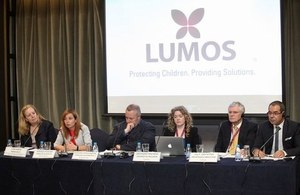British Embassy Sofia takes part in a seminar on deinstitutionalisation
Deputy Ambassador Sarah Riley took part in a Lumos seminar on deinstitutionalisation and highlighted the importance of having all stakeholders on board for the good of the children.

Deputy Ambassador Sarah Riley took part in a Lumos conference on deinstitutionalisation and advising governments on reorganising their finances to support reform of child care systems and the closure of institutions
On 16 June 2015 Deputy Ambassador Sarah Riley took part in a seminar dedicated to the need of creating a cross-ministerial financial strategy for deinstitutionalisation. The seminar was organised by Lumos Foundation.
Speaking at the seminar, Deputy Ambassador Sarah Riley said:
The importance of the deinstitutionalisation process is unquestionable. It was encouraging that the then government adopted in 2010 the National Strategy “Vision for Deinstitutionalisation” with the aim of closing all 137 large-scale residential institutions for children by 2025.
This strategy outlines the political will to achieve social inclusion and well-being for all children, as well as the attainment of European standards in this field, as the government seeks to move away from the use of state-owned children’s homes and replace these with alternative services, such as foster care. The process of deinstitutionalisation is now in its critical phase as hundreds of children and young people with disabilities across the country are being moved to the newly structured services.
What has been achieved up to now has been vital. These are the first steps of many which will ensure there is a clear plan for the way forward and that no children are deprived of a loving family environment. Whatever the goal, it is always essential to have all stakeholders on board and combining their efforts to achieve that goal. Likewise, the process of creating a new system of care for children with complex needs requires unity and consistency in the activity of all sectors and institutions, both governmental and non-governmental. The Ministry of Finance has the greatest understanding of the savings that can be made over many generations if all children can go on to play a full role in the future in Bulgaria, and are not sidelined or marginalised.
Planning for the next stage of the process, whether that is a new Action Plan for the next programming period or an extension of the current one, should not be slowed down. The new services created so far need real and sustained support to be able to fulfil their aim – namely to guarantee adequate alternative services for children to ensure that all children can thrive. Without timely and planned investment there is a risk these alternative services will just duplicate the institutional model. The NGOs, with their wide spectrum of expertise, are a natural participant in the whole process. It is good to hear that the inclusion of NGOs in that process is part of the discussion.
I wish this seminar every success in achieving its goal of working towards a Cross-ministerial Financial Strategy for Deinstitutionalisation of Children’s Services. In the British Embassy, we follow the process closely as part of our wider work in support of human rights in Bulgaria, including children’s rights. Lumos have provided valuable support to the Bulgarian government and are involved in key deinstitutionalisation projects. I am sure this event will make a valuable contribution to the meaningful initiatives which work to improve the lives of vulnerable children in Bulgaria.